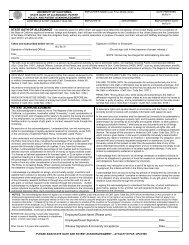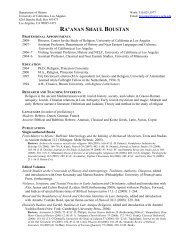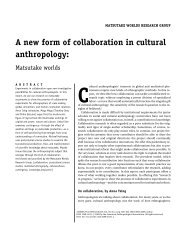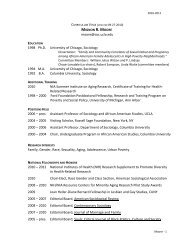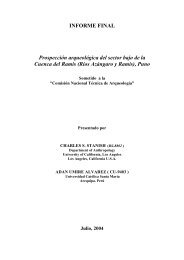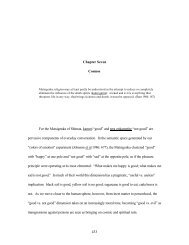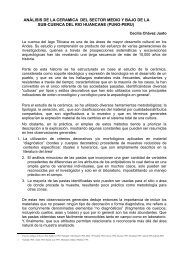The Long-Term Effects of Africa's Slave Trades - Social Sciences ...
The Long-Term Effects of Africa's Slave Trades - Social Sciences ...
The Long-Term Effects of Africa's Slave Trades - Social Sciences ...
You also want an ePaper? Increase the reach of your titles
YUMPU automatically turns print PDFs into web optimized ePapers that Google loves.
the total volume <strong>of</strong> slaves traded was unprecedented. During the trans-<br />
Atlantic slave trade alone, approximately 12 million slaves were exported<br />
from Africa. This figure does not include those who were killed during the<br />
raids or those who died on their journey to the coast. 4 Africa’s slave trades<br />
were also unique because, unlike previous slave trades, individuals <strong>of</strong> the<br />
same or similar ethnicities enslaved one another. This aspect <strong>of</strong> the slave<br />
trades had particularly detrimental consequences. 5 According to historical<br />
evidence, the external demand for slaves impeded state development, causing<br />
weakened states, promoted political and social fragmentation, causing<br />
ethnically fractionalized societies, and resulted in a deterioration <strong>of</strong> domestic<br />
institutions, particularly judicial institutions. 6<br />
2.2.1 Ethnic Fractionalization<br />
<strong>The</strong> detrimental impacts <strong>of</strong> the slave trades arise because the capture <strong>of</strong><br />
slaves occurred by Africans raiding other Africans. <strong>The</strong> most common manner<br />
in which slaves were taken was through villages or states raiding one<br />
another (Lovejoy, 1994; Northrup, 1978). Where groups <strong>of</strong> villages had<br />
previously developed into larger scale village federations, relations between<br />
the villages tended to turn hostile (Inikori, 2000). Villages began raiding<br />
each other, destroying the established codes <strong>of</strong> conduct concerning warfare<br />
that had promoted peace to this time. Kusimba (2004, p. 66) writes that<br />
“insecurity confined people within ethnic boundaries constructing spheres<br />
<strong>of</strong> interaction”. Hubbell (2001) documents this process for the region <strong>of</strong><br />
Souroudougou, which is located on the border <strong>of</strong> Burkina Faso and Mali.<br />
<strong>The</strong> networks and federations <strong>of</strong> villages that had formed, were destroyed as<br />
a result <strong>of</strong> the increased warfare, conflict, banditry, and suspicion generated<br />
4 <strong>The</strong> Roman slave trade comes closest to matching the volume <strong>of</strong> the trans-Atlantic<br />
slave trade. Scheidel (1997) estimates that in the early Roman Empire, over a period <strong>of</strong><br />
four centuries, between 10,000 and 15,000 slaves were shipped into the Empire annually.<br />
This is a total <strong>of</strong> 4 to 6 million slaves, which is less than half <strong>of</strong> the volume <strong>of</strong> the trans-<br />
Atlantic slave trade.<br />
5 In early Rome, the primary source <strong>of</strong> slaves were prisoners captured by Roman soldiers<br />
during wars <strong>of</strong> expansion. In later periods, slave populations were sustained primarily<br />
through slave breeding (Bradley, 1987). In Greece, clear regulations and institutions<br />
prevented the enslavement <strong>of</strong> people <strong>of</strong> Greek origin, even when they were imprisoned, or<br />
captured in local civil wars (Garlan, 1987).<br />
6 Because the effects <strong>of</strong> the slave trades were not homogenous across all regions <strong>of</strong> Africa,<br />
it is potentially dangerous to generalize the experience <strong>of</strong> the entire continent. I focus here<br />
on the effects <strong>of</strong> the trans-Atlantic slave trade in particular. This is because, as I show in<br />
Section 7, the empirical results are driven by the trans-Atlantic slave trade. This is not<br />
surprising given that this is the largest <strong>of</strong> the four slave trades.<br />
5




